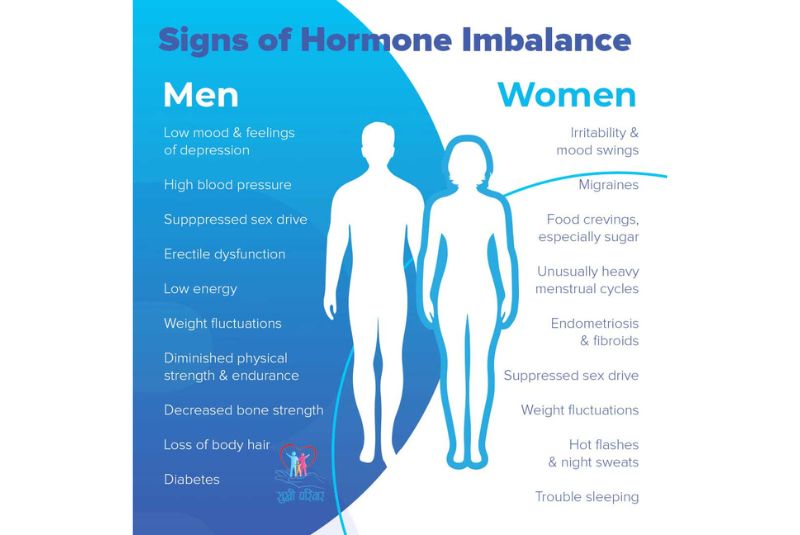Endocrine Imbalances

Endocrine Imbalances
Endocrine imbalances occur when the body produces either too much or too little of one or more hormones, disrupting the normal regulation of bodily functions. Hormones, secreted by endocrine glands directly into the bloodstream, act as chemical messengers that regulate metabolism, growth, reproduction, mood, and other vital processes.
Causes
- Dysfunction of endocrine glands or their regulatory feedback systems.
- Genetic disorders (e.g., multiple endocrine neoplasia, congenital hypothyroidism).
- Tumors or nodules on endocrine glands affecting hormone production.
- Infections, injuries, or autoimmune diseases targeting endocrine tissues.
- Medications or environmental factors influencing hormone levels.
Common Types of Endocrine Disorders
- Diabetes mellitus: Impaired insulin production or action leading to high blood sugar.
- Adrenal insufficiency (Addison’s disease): Low cortisol and aldosterone levels.
- Cushing’s disease: Excess cortisol due to pituitary overproduction.
- Hyperthyroidism: Overactive thyroid causing weight loss, rapid heart rate, nervousness.
- Hypothyroidism: Underactive thyroid causing fatigue, weight gain, depression.
- Growth hormone disorders: Excess (gigantism/acromegaly) or deficiency affecting growth.
- Polycystic ovary syndrome (PCOS): Androgen excess causing menstrual irregularities and infertility.
- Hypopituitarism: Reduced pituitary hormone secretion affecting multiple glands.
- Precocious puberty: Early hormone release causing premature puberty.
Symptoms
- Fatigue, weakness
- Unexplained weight changes
- Mood swings, depression, anxiety
- Changes in heart rate or blood pressure
- Skin changes or hair loss
- Infertility or menstrual irregularities
- Excessive thirst or urination
- Bone fractures or muscle weakness
Diagnosis
- Blood and urine hormone level tests, including glucose tolerance or insulin tolerance tests.
- Imaging (ultrasound, CT, MRI) to detect gland abnormalities or tumors.
- Physical examination and detailed medical history.
Treatment
- Hormone replacement therapy for deficiencies (e.g., synthetic thyroid hormone, growth hormone injections).
- Medications to suppress excess hormone production or block hormone effects.
- Surgery or radiation for tumors affecting hormone secretion.
- Lifestyle modifications and supportive care tailored to the specific disorder.
Summary Table
| Aspect | Details |
|---|---|
| Causes | Gland dysfunction, tumors, genetic disorders, autoimmune diseases, medications |
| Common Disorders | Diabetes, adrenal insufficiency, Cushing’s disease, hyper-/hypothyroidism, PCOS, growth hormone disorders |
| Symptoms | Fatigue, weight changes, mood disturbances, reproductive issues, cardiovascular changes |
| Diagnosis | Hormone assays, imaging, physical exam |
| Treatment | Hormone replacement, medications, surgery, radiation, lifestyle changes |
Consult with Our Team of Experts Now!
At DrStemCellsThailand (DRSCT)‘s Anti-Aging and Regenerative Medicine Center of Thailand, we emphasize comprehensive evaluations and personalized treatment plans of Cellular Therapy and Stem Cells for managing various health conditions. If you have questions about Endocrine Imbalances or would like more information on our services, consult with our experts today!
Consult with Our Team of Experts Now!
References
- Cleveland Clinic: Hormonal Imbalance: Causes, Symptoms & Treatment [https://my.clevelandclinic.org/health/diseases/22673-hormonal-imbalance][1]
- WebMD: Endocrine Disorders: Types, Causes, Symptoms, and Treatments [https://www.webmd.com/diabetes/endocrine-system-disorders][2]
- Medical News Today: Hormonal imbalance: Symptoms, causes, and treatment [https://www.medicalnewstoday.com/articles/321486][3]
- Tampa General Hospital: Endocrine Disorders: Causes & Treatment [https://www.tgh.org/institutes-and-services/conditions/endocrine-disorder][4]
- Upstate Medical University: Common Endocrine Disorders: Causes, Diagnosis, and Treatment [https://www.upstatemedicine.com/2024/03/08/common-endocrine-disorders-causes-diagnosis-and-treatment/][5]
- UC Davis Health: Hormonal and Endocrine Disorders in Women [https://health.ucdavis.edu/conditions/hormonal-endocrine-disorders-women][6]
Endocrine imbalances can affect multiple body systems and require careful diagnosis and individualized treatment plans to restore hormonal balance and improve quality of life.















